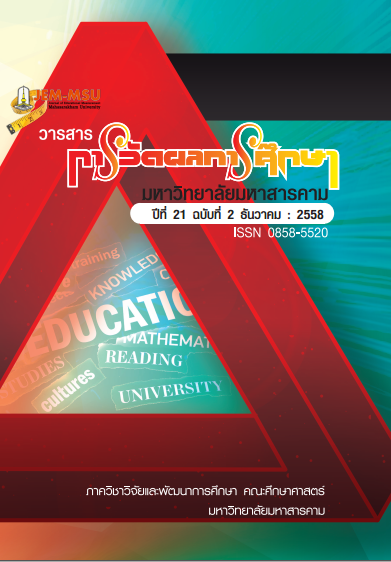Development of Learning Management for Enhancing Self-Regulation in Learning of Prathoseuksa 6Students, Under The Office of Roi-Et Primary Educational Area Zone 2
Main Article Content
Abstract
This study purposes were : 1) to study the current state with problems of learning and develop the handbook for learning management to enhance selfregulated learning with Prathomsuksa 6 students effectively; 2) to evaluate the effectiveness of that learning management approach, which were effected to selfregulated learning behaviors, characteristics in reading habit, perception of selfefficacies, and behaviors in self-regulated for learning performance of the students who learned through the handbook for learning management between before and after providing learning activities. The target group in studying was consisted of 69Prathomsuksa 6 students from three schools under the Office of Roi-Et Primary Educational Area Zone 2, in the academic year of 2014. Those schools were Ban Doofhaiyhai school, Ban Koacklang school, and Muang Patumratt school, which the group of student participants were selected by purposive sampling technique. The research methodology used in this study was participatory action research among researcher and 3 research participants, those provided for 1participants in each school. This research approach used mentoring activity forsix times in guiding the teachers who were research participants to understand about learning management and took the handbook forlearning management to provide with the students and investigate for products of self-regulated learning. The research instruments were used in gathering data were : 1) the note taking form for focus group of participant teachers concerned about problems and current state of learning management to enhance self-regulated learning of students, 2) the handbook for learning management to enhance self-regulated learning of students, 3) the plans for learning management with this approach with 28 plans those provided 1 hour for each plan, 4) the assessing form for behaviors in self-regulated learning of students, and constructed for 20 items of rating-scales, 5) the assessing form for self-evaluated in reading habit characteristics, and constructed for 20 items of rating-scales, 6)the assessing form for perception in self-efficacy of students, and constructed for 30 items of rating-scales, and 7) the assessing form for ability in self-regulated on task performance of students, was provided with self-report in five aspects. The statistics were used in data analysis consisted of mean, standard deviation, percentage and descriptive narration for qualitative data analysis. The results of the study were as follows : 1. The students in Patumrat’ s Network Center of Educational Quality Development yet lacked of promoting their self-regulation effectively and needed to support in that characteristic more systematically. Whereas, there sults of developing for handbook of learning management to enhance the student’s self-regulated learning found that, the components of handbook for learning management approach were comprised of; 1) the principles of learning management approach, 2) the learning management’s objectives, 3) the learning process, 4) the assessment of learning management, and 5) the instruments used for learning management activities. Whereas, the steps of learning management were comprised of 5 stages thus were : 1) probing of learning situations with understanding, 2) analyzing of goals and motivating the learners , 3) providing of framework and motivating for performance, 4) encouraging and monitoring of performance, and 5) reflecting and improving of performance. Including the result in assessment of handbook for learning management from experts was at a high level. 2. The students who provided in learning based on this approach were found that; they had higher of behaviors on self-regulated learning than before providing activity, with average score at 3.16 and 3.90 respectively; had improved reading disposition characteristic higher than before learning management at a high level, with average score at 3.12 and 3.99 respectively ; and had improving of perception in self-efficacy higher than before learning management at a high level, with average score at 3.15 and 4.06 respectively. Including they had abilities of selfregulation in learning tasks at a high level, those determined by information records of effort in task performing, besides attending and interesting in each assigned working. Which were depended on goal settings, thought and choosing about effective task executing. Furthermore, the task monitoring could lead to improve of better working, with in systematical and continuous performance, and then the students perceived themselves had abilities in performing of learning tasks with goal attainment successfully
Article Details
The content and information contained in the published article in the Journal of Educational Measurement Mahasarakham University represent the opinions and responsibilities of the authors directly. The editorial board of the journal is not necessarily in agreement with or responsible for any of the content.
The articles, data, content, images, etc. that have been published in the Journal of Educational Measurement Mahasarakham University are copyrighted by the journal. If any individual or organization wishes to reproduce or perform any actions involving the entirety or any part of the content, they must obtain written permission from the Journal of Educational Measurement Mahasarakham University.


